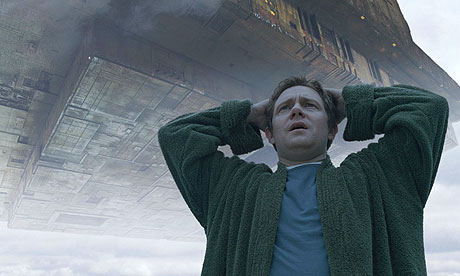I like that definition better than, "Parody is making a new wine that tastes like the old but has a slightly lethal effect." --which is partly true, a parody should have the flavor of its predecessor, yet doesn't necessarily have to be in (lethal) mockery. Some parodies can be homages, which is what I'm going to focus on, and save the satire for another day.
One excellent example that everyone should be watching, and if you aren't you are completely The Venture Bros. Why is this show so great? Because it goes above and beyond what parodies normally do, which is just make fun of their source material. The Venture Bros. started as a parody of Johnny Quest, but has evolved into its own little universe with complex characters and deep back stories.
 | |
| (top) The Venture Bros. (bottom) Johnny Quest |
Dr. Thadeus "Rusty" Venture, a failed super-scientist who has major daddy issues, blaming his father for just about everything wrong in his life and taking little credit for his own actions, some of which are rather slimy. Yet, although unlikable, you can't fully blame him because he was forced into this life, following in his father's footsteps, when clearly--as you find out later on in the series--he had passions in other things, such as music and theater.
The boys (based off the Hardy Boys) Hank and Dean Venture, are spared a similar fate due to their father's ineptitude, allowing them to strike out their own paths. They are actually two of the very few characters who have any hope on the show, seeing as they're young and haven't screwed up their lives yet.
Yes, the show is mainly about failures and fuck-ups. It's not as depressing as it sounds, because it's what makes these characters human. Dr. Venture's ache-nemesis, The Monarch, sucks at the whole arching thing, and is basically a giant man-child who needs his wife and faithful Henchman 21 to clean up after him. But he has passion--the kind that inspires others to do his stupid bidding.
The show even goes so far as to have a empathetic pedophile as a character, Sargent Hatred. I know a lot of people dislike this character just because of the fact that he's a pedophile, but the thing is, Hatred doesn't act on his behavior, and in one episode, locks himself away so he can't do any harm.
Honestly, I think this is something a lot of writers are afraid to do: allow their characters to make mistakes. Because mistakes are bad, and we don't want our precious characters to do anything bad. Thus we wind up with a bunch of passionless, inhuman characters.
The reason I site a TV show as an example of parody, is because most writers don't read. A sad and astounding truth. Also, because there are not a lot of good examples of parodies in the writing world. Most of them just poke fun at the source material without attempting to develop the characters into something more, making them very forgettable.
Fortunately, author Milo James Fowler still understands what makes a good parody. His Coyote Cal series is a parody of those old spaghetti westerns, that takes the West into weird and unusual directions. Coyote Cal is the over-the-top good guy, accompanied by his grumbly goofy side-kick Big Yap. They get into mishaps while breaking the fourth wall. But Coyote Cal has a past, as we learn in Harbinger of Arroyo Seco, he wasn't always the hero with the pearly-white smile, and could've easily been a villain himself.
That's the important thing I want to get across: do something more than just a parody.
Create characters, create a story, just with the flavoring of the text (or show) you're spoofing.
If you haven't seen a spaghetti western, you may not get all the jokes, but you'll still enjoy Milo's Coyote Cal. Likewise, you don't have to watch an episode of Johnny Quest to "get" The Venture Bros. That's the brilliance of these parodies, and that's why they'll live on for years, maybe even decades, to come.
Once again, longevity: make your laughs last.
So that ends parodies. I know this post took forever, hopefully my next one doesn't. Although I might detour and do a review. We'll see!
*edit* I realize I should probably put some The Venture Bros. clips, since I didn't talk about in what way they parody, and that's mainly because they parody so many things. So here's a taste of their spoofings.


